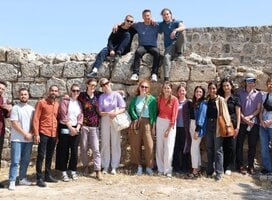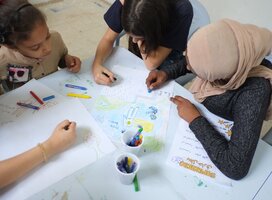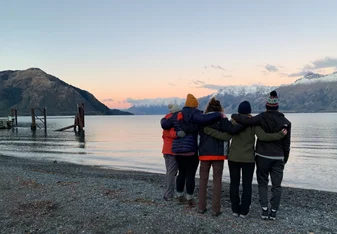Volunteer Programs in the Middle East
Rich in culture and history, the Middle East is an intriguing volunteer destination with options in multiple countries. Although it is often associated with complex regional conflict, the Middle East is also known for its hospitable people and amazing ancient remnants sure to impress any history buff. Whether helping at a Jordanian school or working with the elderly in Israel, volunteers will get the chance to interact with local Middle Eastern communities and discover a unique culture.
Community Development
Impoverished areas of the Middle East are in need of extra assistance to enhance or add to existing community facilities. Some schools in the region have been built as a result of donations, but these donations do not cover maintenance costs. Volunteers are needed to help with the upkeep of community structures that provide services to orphans and disadvantaged children. Volunteer work may involve hands-on activities like painting and performing basic repairs.
Because many in the Middle East and surrounding areas have been displaced from their homes, the region provides a unique opportunity for volunteers to provide support to refugees in special community centers. Among the many options available, volunteers can choose to help at a kibbutz in Israel and work with young Ethiopian refugees to make them feel more at home. Volunteering in community development is a great way for volunteers to integrate themselves in their surrounding environments and truly connect with the local population.
Teaching English
Due to a high demand for English teachers in the Middle East, prospective volunteers will find English teaching opportunities in many Middle Eastern countries. Whether at an orphanage or school, volunteers can interact with and inspire less fortunate children. Some programs allow volunteers to connect with these children on an even deeper level by providing volunteers with the opportunity to visit the children they teach in their homes. Teaching needs are higher in the rural areas of the region, where volunteers will experience profound cultural immersion and provide students with vital skills that could improve their future livelihoods.
Conservation
The Middle East also provides opportunities for those passionate about protecting the environment. Volunteers can boost environmental awareness in their respective regions or assist with an area’s ecotourism efforts. For example, volunteers may find themselves traveling to Turkey to generative public awareness on a clean environment while helping collect waste. Ecotourism opportunities are a great way to both contribute to a community’s well-being and promote environmental awareness. This could entail working in an ecolodge or educating visitors at ecotourist spots.
Volunteers can also pursue wildlife conservation projects in unique desert landscapes such as the Arava region of Israel. These projects give volunteers the chance to help with the re-population of natural reserves with various animal species and provide an adventurous setting in which to discover areas of the Middle East.
Middle Eastern Lifestyle & Culture
Although it is difficult to characterize the culture of such a large and ethnically diverse region, there are some common themes that can be found throughout the Middle East. Family values are held highly, and volunteers will receive a warm welcome when hosted by Middle Eastern families, who are well known for their hospitality. When eating in the Middle East, let your hosts know that you are enjoying the food, as this is taken as a compliment, and avoid saying no too often to offers of food. Volunteers should also keep in mind that timing is not as precise in the Middle East, and events don’t normally begin right at the minute.
Specific dress codes will vary with each country, but in general it is smart for women in particular to dress more conservatively and be aware of how religious the environment is. Volunteers should also be aware of religious holidays such as Ramadan and remember that shops in different neighborhoods close down on certain days for Muslim holy day, Jewish Sabbath, or other reasons depending on where you are.
Languages in the Middle East
Each area of the Middle East has its own dialect within different languages, but Arabic is the most commonly spoken language. Other languages include Farsi (Persian), Turkish, Berber, Kurdish, and Hebrew. English is spoken in most urban areas, but volunteers working in more rural areas may want to learn some basic words and phrases in the language of their chosen area. Volunteers who have not yet decided where they will be volunteering in the region should consider learning some basic Arabic as Arabic is spoken in the majority of Middle Eastern countries.
Cost of Living
The United Arab Emirates, Israel, and Saudi Arabia are among the countries in the Middle East with the highest costs of living. Urban areas will be pricier to live in, but the cost of living in rural areas is generally lower relative to the Western world. As with most regions abroad, expect imported goods to be more expensive. Volunteers in general will find that they can save money by living with others or sharing a home with a local family through a homestay.
Health and Safety of Volunteers in the Middle East:
Many in the West are hesitant to travel to the Middle East due to safety concerns. However, it is entirely possible to have a safe abroad experience in the region. Before arrival, volunteers can consult their country’s travel advisories to check for any warnings in particular areas to ensure these places are avoided. It also helps to ask locals about unsafe places after you have arrived.
Volunteers should use common sense and consider learning the local language. The same advice goes for women, who are sometimes concerned about the specific safety of women in the Middle East. Women should avoid going anywhere alone with a man or group of men they don’t know very well, though this is true for any region. In some countries where Sharia Law is stricter, such as Saudi Arabia, it is not common to see women alone in public, and women can avoid strange looks by travelling with a male or group. However, this doesn't necessarily mean women travelling solo will be unsafe; just use common sense and be aware of your surroundings.






















